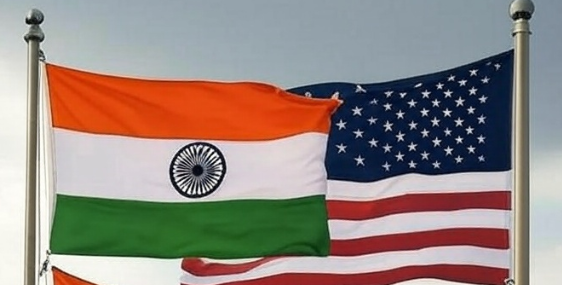Is Trump 2.0 Threatening US-India Ties? Donald Trump’s second term is already shaking up US foreign policy, with India now under unexpected scrutiny. With a diplomatically inexperienced team and contradictory messages, Trump 2.0 threatens to unravel the progress built over decades in the Indo-US relationship.
Is Trump 2.0 Threatening US-India Ties
In diplomacy, two things matter more than anything else—words and wisdom. It’s not a game of brute strength or showmanship. You cannot bulldoze your way through global affairs, especially in today’s multipolar world. Words must be chosen carefully, and actions must be rooted in understanding and experience. Unfortunately, both appear to be missing from Donald Trump’s second-term administration. The latest example comes from Trump’s Commerce Secretary, Howard Lutnik, who publicly criticized India for “rubbing America the wrong way.”
Lutnik, who previously spent his life working on Wall Street and has no political or diplomatic background, has now been entrusted with leading US trade relations. His main complaints? That India buys weapons from Russia and that it is a part of BRICS—a multilateral alliance aimed at reducing dependency on the US dollar. According to Lutnik, such moves irritate America. He argues that India’s defense purchases from Russia and its alignment with BRICS “are not the way to make friends and influence people in America.”
But these criticisms lack context. India’s defense ties with Russia are long-standing and widely known. The S-400 air defense system deal signed in 2018, for example, was neither secretive nor abrupt. India has proudly maintained its strategic autonomy, choosing its partners based on its national interest rather than global pressure. Similarly, BRICS is not an underground club—it is a well-known international alliance whose meetings are held in the open and covered globally. Lutnik’s remarks show a poor grasp of basic international realities.
What’s more worrying is that these criticisms are coming from an administration that itself is displaying contradictory behavior. Trump has in the past confused Spain as a BRICS member and often repeats questionable claims about India. He has labeled India the “tariff king” and repeatedly taken credit for brokering peace in the India-Pakistan conflict, including in Kashmir. At one point, he claimed his administration helped end a “thousand-year war” in the region, stating that they had arranged a “full and immediate ceasefire”—a statement that does not align with any official diplomatic developments between India and Pakistan.
All of these points point to a bigger issue: the lack of foreign policy expertise within Trump’s current team. Howard Lutnik, with zero political or diplomatic experience, was brought into the 2024 campaign and now holds a powerful position. Vice President JD Vance also has limited political experience and even less foreign policy understanding. During Operation Sindoor —a recent Indo-Pak conflict—Vance initially dismissed it as “none of his business,” only to scramble later and call Indian officials in response to rising tensions. Director of National Intelligence Tulsi Gabbard, once a vocal supporter of India, has gone completely silent on South Asia post-Sindhur, with reports suggesting she has been sidelined. Then there’s T. Witkov, who serves as an envoy on various issues. He has no background in diplomacy and was reportedly Trump’s golf partner before taking office. Adding to concerns, Witkov and his sons co-own a crypto company that recently signed a deal with Pakistan, suggesting a potential conflict of interest.
The only remaining seasoned voice in Trump’s diplomatic circle appears to be Marco Rubio. Until recently, there was also National Security Adviser Mike Waltz, but he resigned following a controversy over Signal chats. In effect, the administration has lost its experienced diplomats and is now being led by individuals with little to no understanding of international relations. This inexperience is already visible in policy missteps and public messaging. Tellingly, Trump has not even appointed a US ambassador to India, signaling a lack of strategic focus on one of America’s most crucial global partners.
A closer look at Operation Sindoor highlights how India carefully balances its global partnerships. Indian forces used BrahMos missiles, Russian Su-30 fighter jets, and S-400 air defense systems. At the same time, Pakistan responded using American F-16s. Despite this nuanced situation, Trump’s officials have decided to criticize India, showing their lack of understanding. Worse still, Trump himself is actively courting Russian President Vladimir Putin, even expressing interest in signing mineral trade deals with Moscow. So while Washington asks India to reduce ties with Russia, the US president is forging his own.
This double standard is not just hypocritical—it is dangerous. India and the US have spent decades building a relationship rooted in mutual respect, shared values, and strategic cooperation. This partnership has never relied on formal treaties or military alliances; rather, it has been nurtured through consistent dialogue and trust. Donald Trump’s first term showed a willingness to strengthen this relationship. But his second term is quickly undoing that progress. If Washington continues to treat India with arrogance and ignorance, it risks eroding a partnership that took years to build.
Diplomacy is not about making noise or issuing threats. It is about navigating complexity with wisdom and foresight. India is not a passive player; it is a global power that expects respect and strategic engagement. If Trump and his team do not recognize that soon, they may push India to seek more reliable and mature partners elsewhere.

